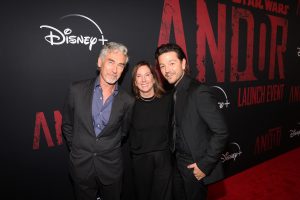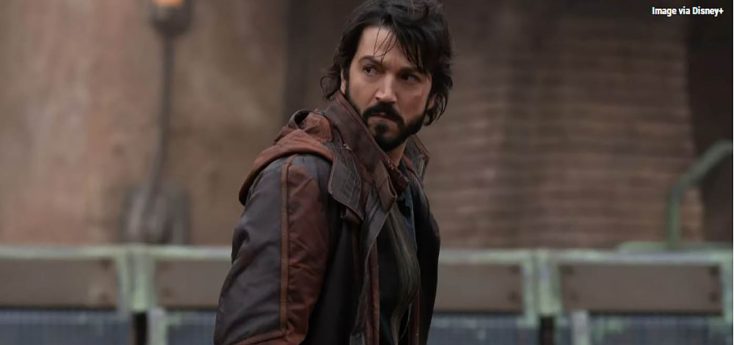
(l-r) Tony Gilroy, Kathleen Kennedy and Diego Luna arrive at the special 3-episode launch event for Lucasfilm’s original series Andor at the El Capitan Theatre in Hollywood, California on September 15, 2022. ©Disney. CR Jesse Grant/Getty Images for Disney.
By JUDY SLOANE
Front Row Features
HOLLYWOOD-In 2016, “Rogue One: A Star Wars Story” premiered to critical acclaim, making over $1 billion worldwide. A prequel to “Star Wars,” it tells of the first triumph of the Rebel Alliance against the Empire.
One of the prominent characters in the movie was rebel captain and intelligence officer Cassian Andor, played by Diego Luna. In a prequel to “Rogue One,” Luna has his own series, “Andor, Part 1” on Disney+. The first 12 episodes startstreaming from September 21, 2022.
Creator/Showrunner Tony Gilroy, who co-wrote the screenplay for the film with Chris Weitz, and Diego Luna, joined the TV Critic Association journalists to discuss their new series.
Q: Can you both talk about the backstory for Cassian? The germination of some of it must come from “Rogue One,” but I’m curious what the process was for anything that either of you had in your minds from that movie that then carried over into the series?
Diego Luna: We started from scratch and it was all in the hands of [Tony.] I was just reacting to Tony’s work and always pretty amused by realizing how close it was to what I had in mind – in essence, obviously, because the story is completely his.
Tony Gilroy: In “Rogue One,” there are snapshots for every character, little moments of truth of who they are, little pieces and shards that go back to who they were. And the pieces that we had for Cassian were that he’d been in the revolution since he was six years old. We know that at the end of the film, he says, my God, if we don’t go out and make this final effort, then all the horrible things that I’ve done for the rebellion [will] be for naught. So we know there’s a very dark period. And I just started to build from those.
It felt very important, particularly for a story where you’re taking somebody on a five-year journey, to really be fully invested in their complete story, from origin and as we know in “Rogue” to the end. So the responsibility to have an abundant, real, important backstory was obvious.
Q: When we met Cassian in “Rogue One,” he was killing a guy, who didn’t deserve to die, for the greater good. Can you both talk about taking Cassian on this journey, where he’s embracing being a rebel and maybe doing better things, although you have to end with him in a somewhat dark place?
Gilroy: The story of revolution and what it really means is very complicated. It’s very interesting to delve into as a writer. I think if we are successful with the 24 episodes that we make, when you watch a lot of scenes in “Rogue” [they] are going to take a deeper significance and resonance. There are so many things that will have been sacrificed along the way and so many regular people that havemade epic decisions.
Luna: You can’t leave the grey areas out when you talk about revolution. When you talk about people surviving, the judgment is different. So we’ll get to explain that. And we’ll get to show you also a community. It’s quite unfair to call the show “Andor” because this is about a community. It’s an ensemble. It’s what we can in community do and what we are capable of if we understand our strength is in our numbers. This show is about that.
Q: What it’s like writing a prequel series when we all know Cassian died in“Rogue One,” and how do you approach that and still have real stakes for the viewers?
Gilroy: Someone asked me this question a week ago, and I finally came up with the answer that I’ve always wanted. We’re all living in a prequel. We’re all going to die, and we’re all in a prequel.
And the suspension of disbelief is even more tenuous than that, because you can watch a movie for the third time, and you just saw it six months before, and you can, if you love it, [be] invested in it. That is not a concern as a dramatist. As an actor, I don’t know, what do you think, Diego?
Luna: No, it’s the opposite. I’m going to challenge everything you think about Cassian. Everything [that] made sense when you were watching the film is now going to be challenged, because I do have that in mind. I know where it ends, and I can be very creative about how to get there.
I think it triggers a different part of your creativity when you start backwards and, as audience not as an actor, there’s nothing I like [more] than going to see a movie about historical moments that I know happened, that I know the end, [with] characters that I’ve read about, and I get to see what’s in between what I read. To me, it challenges audiences in a very special way.





